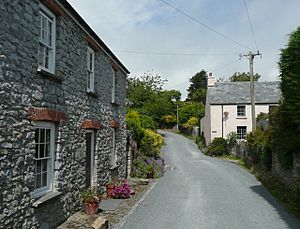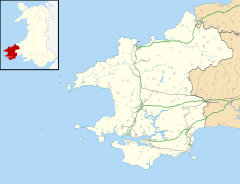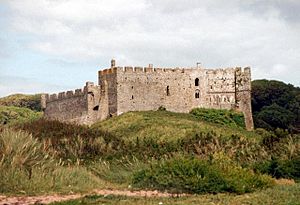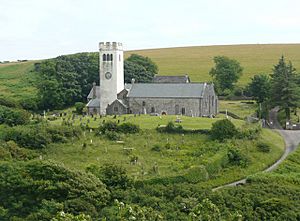Manorbier facts for kids
Quick facts for kids Manorbier
|
|
|---|---|
 The Village Street |
|
| Population | 1,327 (2011) |
| Community |
|
| Principal area | |
| Ceremonial county | |
| Country | Wales |
| Sovereign state | United Kingdom |
| Post town | TENBY |
| Postcode district | SA70 |
| Dialling code | 01834 |
| Police | Dyfed-Powys |
| Fire | Mid and West Wales |
| Ambulance | Welsh |
| EU Parliament | Wales |
| UK Parliament |
|
| Welsh Assembly |
|
Manorbier is a lovely village located on the south coast of Pembrokeshire, Wales. It's also a community and a parish. The name Manorbier means the 'Manor of Pŷr', named after Saint Pyr. This community includes other small places like Jameston, Lydstep, and Manorbier Newton.
Manorbier is part of the Pembrokeshire Coast National Park. It's a popular spot for visitors because of its amazing Manorbier Castle, the historic St James's Church, a beautiful sandy beach, and stunning cliffs. You can also walk along part of the Wales Coast Path here.
The area has its own electoral ward, which is a special district for voting. This ward stretches inland towards St Florence. In 2011, about 2,083 people lived in this wider area. You can reach Manorbier by train, as it has its own Manorbier railway station on the West Wales Line.
Contents
A Look into History
You can find ancient clues about Manorbier's past everywhere! Along the stream bed and cliffs, you might spot fossils. These show how the rocks were formed a very long time ago.
Scientists have found many flint tools from the Stone Age here. These tiny tools, called microliths, tell us that people lived in this area thousands of years ago. You can see some of these tools in local museums. There's also a special ancient stone monument called the King's Quoit near Manorbier bay.
Later, during the Bronze Age, people built burial mounds on the Ridgeway. There's also evidence of old forts. One Iron Age fort was near the railway station. Another was a large hill fort at Old Castle Head, with multiple ditches for protection. You can also see a well-restored lime kiln behind the castle.
Norman Influence
The Normans arrived in Pembrokeshire after 1103. A Norman knight named Odo de Barri was given the lands of Manorbier. The first Manorbier Castle was a simple wooden fort. Later, in the 12th century, stone walls were added by other Normans, making it much stronger.
The St James's parish church was also built in the 12th century. It's a very important historic building, listed as Grade I. Many other buildings in the area are also protected because of their history.
From 1933 to 1946, Manorbier had an airfield. It was used for both regular flights and by the Royal Air Force during World War II. Today, this site is used by the Royal Artillery for testing high-speed missiles.
Famous People from Manorbier
One of the most famous people born in Manorbier was Giraldus Cambrensis, also known as Gerald of Wales. He was born around 1146 and was a priest and historian. He loved Manorbier very much and called it "the pleasantest place in Wales."
Getting Around by Train
Manorbier railway station is on the Pembroke Dock branch of the West Wales Line. Transport for Wales Rail operates the trains and manages the station. Trains stop here about every two hours if you ask them to. You can travel west to Pembroke Dock or east to Tenby, Whitland, Carmarthen, and Swansea.
Manorbier's Twin Town
Manorbier has a special friendship with a town in France! It is twinned with Vernou-la-Celle-sur-Seine. This means they share cultural exchanges and friendly connections.





